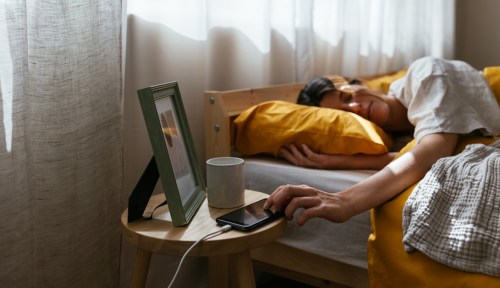Like anything that you might do half-awake, smashing the snooze button is probably something that you don’t think all too much about, if you’re in the approximately 50 percent of people who make use of the sleep-a-bit-more function. When your alarm nudges (or perhaps shocks) you into wakefulness, you might find it nearly reflexive to just hit snooze and steal a few more minutes of shut-eye before your day begins. But as it turns out, the short-term treat of snoozing isn’t all it’s cracked up to be for your energy levels. And according to science, you shouldn’t sleep on the negative long-term effects of snoozing, either.
Experts in This Article
board-certified physician, certified sleep specialist, sleep coach, and founder of The Solution is Sleep
While it’s true that you could clock a few more minutes of sleep by snoozing your alarm (and that may seem like a good thing, particularly if you’re sleep-deprived), the sleep that you’re getting between dings is not the good-quality stuff. “This is fragmented sleep, which is poor-quality sleep that can leave you feeling less rested,” says sleep physician Angela Holliday-Bell, MD. And that makes sense when you think about it: Dozing off isn’t exactly restful when you’re being jarred awake again before you know it.
Below, Dr. Holliday-Bell shares why the sleep-wake pattern triggered by snoozing can leave you groggy, how the effects of snoozing can impact your health long-term, and how to resist the urge.
The real-time negative effects of snoozing your alarm
Any noise-based alarm tends to activate your sympathetic nervous system: the fight-or-flight response that jolts you awake with a release of cortisol, which temporarily elevates your heart rate and blood pressure. While this is not the best way to wake up (that would be waking up naturally or with a gentle no-sound alarm clock), the demands of life might require you to wake up this way, particularly if you have to be awake at a time that doesn’t align with your natural sleep chronotype. The problem with snoozing, though, is that it puts your body through the ringer of awakening in this high-stress fashion not just once but multiple times.
“Sleep fragmentation can leave you feeling worse than you would have if you hadn’t interrupted your sleep cycle with the snooze button in the first place.” —Angela Holliday-Bell, MD, sleep physician
And the second (and third and fourth…) time you wake up post-snoozing may be even tougher than the first, given that you’re more likely to be waking yourself up in the beginning or middle of a REM cycle, says Dr. Holliday-Bell. “We experience more REM [aka rapid eye movement] sleep as we approach the morning—meaning that if you snooze, you’re likely to fall back into a REM cycle but won’t have time to complete it before your alarm goes off again,” she says. “This sleep fragmentation can leave you feeling worse than you would have if you hadn’t interrupted your sleep cycle with the snooze button in the first place.”
That’s because sleep inertia—which is that drowsy just-woke-up feeling—sticks around longer when you wake up from a deeper sleep stage, like REM sleep, than it does when you wake up from a light sleep stage, says Dr. Holliday-Bell. And again, because those deeper sleep stages are lengthier and more common in the hours just before you get out of bed, you’re all the more likely to fall back into one of those phases post-snooze and have that much more trouble shaking off the sleepiness when your alarm rings once again.
The potential long-term drawbacks of snoozing
Over time, hitting the snooze and subjecting your body and brain to the shock of an alarm clock not just once but multiple times each morning may actually leave you with a higher resting heart rate, according to a recent study. The researchers followed 450 people who wore sleep-stage and heart-rate trackers for 10 months, and found that snoozers had, on average, a heart rate that was more than two beats per minute higher than that of the non-snoozers. And though heart rate isn’t the end-all, be-all of health metrics, a lower one often implies more efficient heart function and better cardiovascular health than a high one.
Aside from this potential heart impact, the effects of snoozing can also put a wrench in your sleep routine the more often you do it. “If you are constantly falling back asleep after your alarm clock goes off, the clock can become a confusing signal for wakefulness,” says Dr. Holliday-Bell. Which is to say, you might struggle even more with actually waking up on time when you need to, and you could find it easier to oversleep on subsequent nights, she says.
“If you are constantly falling back asleep after your alarm clock goes off, the clock can become a confusing signal for wakefulness.” —Dr. Holliday-Bell
Even if you’re not necessarily falling back asleep between the alarms, and you’re really just using the snooze period to chill for a few minutes before getting up, that’s still probably not the best idea long-term. “I always recommend getting out of bed within five minutes of your alarm going off because the more time you spend in bed doing things other than sleeping, the more your brain starts to connect those activities with being in bed, rather than sleeping,” says Dr. Holliday-Bell. “So, if you continue to snooze and end up staying awake in bed, thinking about the day or how you have to get up soon, it can cause your brain to connect those feelings with being in bed, which dilutes the bed-sleep relationship and can hurt your sleep quality.”
If you’d still like to take a few quiet moments for yourself in the morning to mentally prepare for the day, just aim to do so while sitting in a chair in another room, rather than while lying in bed.
4 key tips to keep yourself from hitting snooze, even when it’s oh so tempting to do so
1. Make sure you are getting enough sleep
Waking up is always easier on the first go-around when you aren’t sleep-deprived, which is why Dr. Holliday-Bell’s number-one tip for avoiding the snooze button is to get the recommended seven to eight hours of sleep whenever possible.
2. Put your phone or alarm out of reach
It may be an oldie, but it’s still a goodie: According to Dr. Holliday-Bell, when you force yourself to physically get up in order to turn off a blaring alarm clock, you’re less likely to simply fall back asleep than you would be if you never left your bed in the first place.
3. Give yourself something to look forward to in the morning
More motivation to get out of bed is another smart defense against the snooze button, says Dr. Holliday-Bell. Whether it’s a breakfast food you crave, a favorite song you’ll listen to in the shower, or just a few minutes of early-morning sunlight, if there’s something you’re looking forward to in the morning, you’ll be less likely to postpone your wakeup.
4. Try a sunrise alarm clock
Again, the blare of a regular alarm clock is not exactly the gentlest way to shuttle your body and mind from sleep to wakefulness in the first place. And by using light instead of sound, a sunrise alarm clock can create a more seamless transition.
Though many sunrise alarm clocks come with a sound function, too, they primarily work by mimicking the light of a sunrise in your bedroom, so that you naturally move to a lighter sleep stage by the point when it’s time for you to wake up. And that makes doing so without the help of the snooze button much easier.
Sign Up for Our Daily Newsletter
Get all the latest in wellness, trends, food, fitness, beauty, and more delivered right to your inbox.
Got it, you've been added to our email list.











